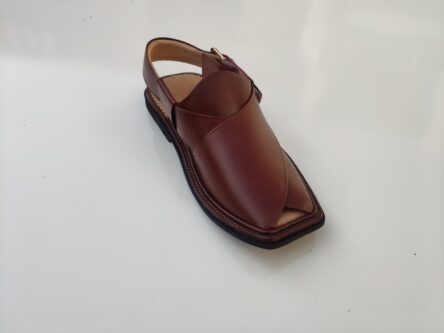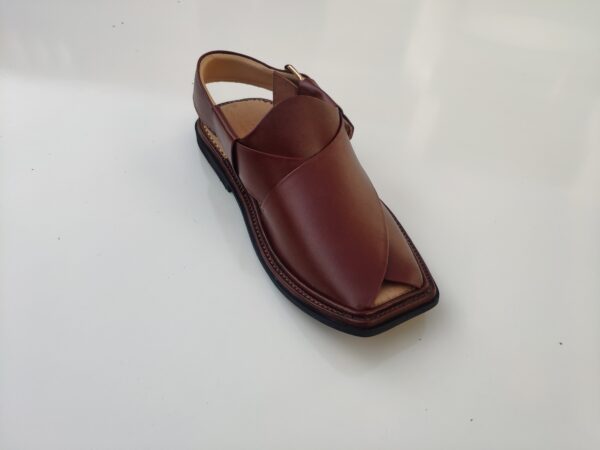Blog
The Rich History and Craft of Peshawari Chappals
The handcrafted Peshawari chappal has a long and storied history in the Peshawar region located in present-day Pakistan. Known for its intricate and colorful embroidery work, this traditional footwear has been worn by men and women in the region for centuries.
What are Peshawari Chappals?
Peshawari chappals are a type of handmade leather sandal that originated in the bazaars of Peshawar, Pakistan. They are characterized by their wide straps, thick rubber soles, and extensively embroidered uppers featuring colorful floral, paisley, and geometric motifs.
The uppers are made from soft goat or cow leather, while the durable soles are crafted from recycled rubber tires.
This vibrant and stylish footwear symbolizes Peshawar’s artisanal history and cultural identity. Due to the popularity of Peshawari chappals across Pakistan and South Asia, the craft faces the threat of machine-made imitation products. However, the appeal of an authentic, hand-stitched pair is unmatched.
The Craft and Making of Peshawari Chappals
The skilled art of crafting Peshawari chappals has been passed down over generations in family-run workshops across Peshawar. It is an intensive process that relies entirely on handwork and takes an experienced artisan about two days to complete just one pair.
It begins with expert cutters who transform raw leather hides into perfectly measured chappal components. The soft sheepskin used for the upper straps and sturdy cowhide for the soles are sourced from local tanneries.
The thick rubber soles are upcycled from old automotive tires and cut into an ergonomic footbed design. The leather upper pieces are then intricately embroidered with silk or cotton thread in vibrant hues and ornamental patterns before being stitched to the sole.
Finally, small decorative mirrors, bells, and tassels are added as embellishments by master craftsmen to complete the Peshawari chappal.
The Bazaars of Peshawar
The best place to purchase authentic and creatively designed Peshawari chappals is in the centuries-old bazaars of the ancient city of Peshawar.
The chappal trade is centered around the Chowk Yadgar bazaar, which houses over 100 specialized shoe stores and workshops offering handmade leather goods. Shoppers can browse through the latest chappal collections and watch artisans at work embroidering and assembling a pair.
Established in the 1890s, the historic Qissa Khwani bazaar is another popular destination for shopping quality Peshawari chappals with over 50 footwear shops dotted along its alleys. Expert salesmen double up as consultants to help customers find the perfect pair based on their foot type, shoe size, and design preferences.
For those wanting to go off the beaten path, neighborhoods like Sethi Mohallah house small hidden workshops where chappal-making traditions have endured over generations behind unassuming storefronts.
Cultural Significance of Peshawari Chappals

Beyond being a fashionable accessory, the Peshawari chappal holds deep social and cultural meaning in Peshawar and the Pashtun community.
It is crafted using the finest materials and workmanship as a gesture of hospitality towards guests who remove their shoes upon entering a home. The mirrorwork embroidered straps are also believed to repel the evil eye.
Historically worn by tribal chieftains and village elders, the Peshawari chappal’s decorativeness embodied the status and identity of Pashtun noblemen. In present times, it remains an important part of traditional attire during weddings, festivals and important social events among Pashtuns.
As a signature of Peshawari craftsmanship, the chappal today represents the city’s heritage. For locals, tourists, and collectors alike, an authentic pair bought from Peshawar’s timeless bazaars makes for the perfect handmade keepsake.
So on your next visit, make sure to bring back a little bit of Peshawar’s rich history with a pair of hand-embroidered Peshawari chappals!
Check out Our Latest Designs.

